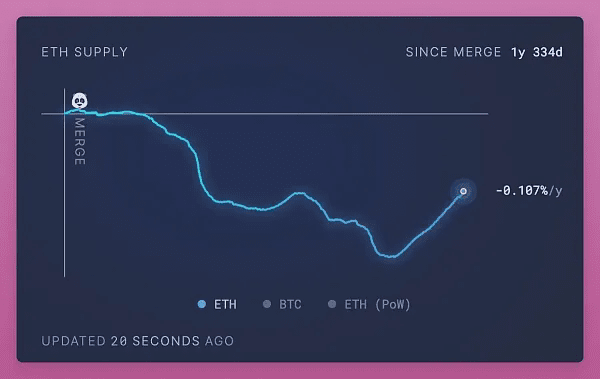У попередній статті було підсумовано попередні оновлення, зміни в ціні Ethereum і чому Ethereum не мав суттєвих переваг після оновлення в Канкуні. Чому за останні шість місяців Ethereum опинився в безглуздий позиції? Чи є ще надія досягти 10 000 доларів? Чи є надія на оновлення Праги? (Частина 1) Підводячи підсумок, я сказав, що поточна ситуація з Ethereum справді не є похмурою, але люди, які думають, що Ethereum повернувся до нуля, не повинні мати жодних ілюзій, але вони є повернувся до нуля?
Резонними питаннями повинні бути:
По-перше, чи стане Ethereum посереднім і стане ланцюгом на тому ж рівні, що й FTX і AVAX, і чи вкраде його центр уваги SOLANA?
Secondly, is Ethereum's path to POS and sharding a mistake? Should it return to POW?
As for the second question, it can be answered immediately: we should not return to POW, as the so-called decentralization is not strong enough, and this is not Ethereum's main pain point at the moment.
If Ethereum returns to POW, it's like a bipedal creature, to prevent cervical issues, learning to walk on all fours again—it's regression.
The path of digital gold already belongs to Bitcoin. To carve out its own path, Ethereum must build the best infrastructure for all DAPPs in the crypto space. Currently, it seems Solana is not the ultimate answer, as single-chain performance has its limits and includes security risks, and BTC is even less so; theoretically, Ethereum is the most viable.
The key is to actually transform concepts into a massive application explosion; besides the crypto space needing to attract new traffic, when new users arrive, the utensils must be prepared so that 'guests' can fully experience the vast array of products in the Ethereum supermarket, with appealing conversations and smooth transactions, without the worry of capital diversion.

If it cannot achieve this, although Ethereum won't fall to the level of FTX, it will find it hard to establish a clear lead over SOLANA.
Next, let's answer the first question: How can Ethereum avoid becoming mediocre?
3. What are the advantages of Ethereum that we take for granted?
Before arguing that upgrades will enable Ethereum to continuously surpass itself and not become 'mediocre', let's see what advantages Ethereum has at present.
Ethereum has become the 'pillar' of the blockchain world, but we must also view its current situation objectively. It seems everyone has grown accustomed to having stunning expectations for it every once in a while, as if it were a superhero, which is a bit harsh. It's important to recognize that Ethereum's robustness itself is already a significant advantage.

First, let's discuss Ethereum's most hardcore advantages—decentralization and security. This is why financial giants like BlackRock and JPMorgan are willing to conduct blockchain settlements and asset tokenization on Ethereum.

Consider that these companies have zero tolerance for 'downtime' or security issues. Solana has experienced several outages recently, which puts it on a completely different level. Ethereum, with its stable performance, allows these giant companies to trust it for financial transactions. It's like choosing a bank; you certainly wouldn't pick one that frequently closes down.
Let's talk about the participation of ordinary users. In the past, staking ETH seemed like something only experts could do; it required technical equipment and handling a lot of complex programs. Now it's different; you can stake ETH at home using ordinary consumer-grade hardware. It's like opening a VIP channel, allowing everyone to participate in Ethereum's ecosystem, making the network increasingly decentralized, and the number of users is rising.
The gas fee issue should also be mentioned. Since March, ETH's gas fees have remained very low, staying below 20 gwei, saving money while keeping low currency inflation, allowing Ethereum's inflation rate to remain below 1%, which is much better than recent VC tokens that have monthly inflation rates of several percent.

It's important to know that low gas fees do not just make transactions cheaper; they indicate the gradual maturity of the DeFi ecosystem. Ethereum is the leader in the DeFi space, with the highest total locked value (TVL) and transaction volume. It's like shopping in a supermarket where you find not only the shelves full but also great discounts, naturally attracting more people to 'shop', thereby increasing ETH's rarity.
Then, don't overlook the power of network effects. As one of the earliest general blockchain platforms, Ethereum has accumulated a large number of developers, and the ecosystem is very vast, resembling a bustling 'innovation hub'. It's like a big city where resources and talent are concentrated, leading more and more startups and projects to choose to settle here. Layer-2 chains and DApps on Ethereum are emerging like mushrooms after rain, creating an increasingly complex and intricate ecosystem, waiting for a significant influx of users at some crucial moment.
Now, let's talk about the tokenization of real-world assets (RWA). Did you know that 52% of stablecoins and 73% of U.S. Treasury bonds have been tokenized on Ethereum? This proves that Ethereum is not only a star in the crypto world but also has great potential in traditional finance. Ethereum has become a bridge, something other chains cannot boast.
Lastly, the ETH ETF has been launched! For investors who don't really understand crypto technology, they can easily access Ethereum through the ETF. It's like giving investors an 'Ethereum ticket'; even if you don't understand blockchain, you can still have a piece of the pie by buying the ETF. This has attracted a large number of traditional investors into this ecosystem, although in the short term, its impact on prices is not as strong as Bitcoin due to a lack of short-term liquidity, with investors splitting a coin in half, spending a large portion on Bitcoin, but the ETF is a long-term positive for Ethereum's future development.
In summary, while Ethereum doesn't always make you go 'wow', its robustness, security, and future potential have made it a 'stable output player' in the blockchain world.



